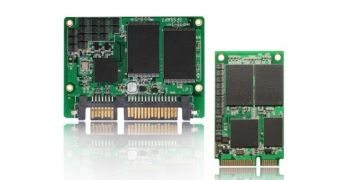A storage drive is called rugged when it can withstand shocks, water and extreme temperatures. Strictly speaking, the new SSDs from ATP aren't rugged, but they should still manage to survive unstable voltages under bad conditions, at least better than normal anyhow.
ATP has released two types of SSDs: mSATA and SlimSATA, both of them featuring PowerProtectorPlus technologies.
These technologies alleviate the consequences of extreme temperature or unstable voltage fluctuations, as well as sudden power outages.
The benefits are provided through a combination of firmware and hardware design elements. ATP assures us that it put the drives through “thousands of power cycles” using ATP Power Cycling Tests before bringing them to market.
Physical endurance is just one of the assets, though. The other is data security, enabled by real-time Full Disk Encryption (FDE) with Advanced Encryption Standard AES 128/256 bit.
On MSATA and SlimSATA drives, these safeguards are actually pretty rare, because it's external and portable media that is most likely to fall into the wrong hands.
So while portable, as well as external but larger and heavier, SSDs do get encryption often enough, drives that go straight inside laptops and other systems don't need it as often.
Nevertheless, because government organizations and corporations employ notebooks to a significant extent, secure storage means are required, hence ATP's latest product release.
Embedded devices, servers, networking platforms, automation and transportation implementations are what the company is looking at here.
Then again, they do have common interface, as far as mobile computing goes, so they will probably do well as boot drives in laptops too, or for SSD caching via Intel Smart Response technology or equivalents.
The capacities of 4 GB to 128 GB make the latter somewhat less appealing, however. The 64 GB and 128 GB units might do fine in notebooks, but the 4 GB, 8 GB, 16 GB and 32 GB ones aren't that great for such instances.
Pricing of the mSATA and SlimSATA SSDs will fall to customers to negotiate with ATP, based on order size and haggling skills. The drives aren't available yet, but they will be showcased at S.E.E. 2014, from April 8 to 10, in Stockholm, Sweden, so they should at least start to sample after that.
"ATP understands customers and market requirements for both mSATA and SlimSATA form factor solutions in its focus markets," said Alex Lee, PM director of ATP.
"Even though other suppliers are phasing out these solutions regardless of customers' long product life cycle needs, ATP reaffirms its position to continue its strong support on these products so customers can rest assure that they will be properly support for years to come."

 14 DAY TRIAL //
14 DAY TRIAL //